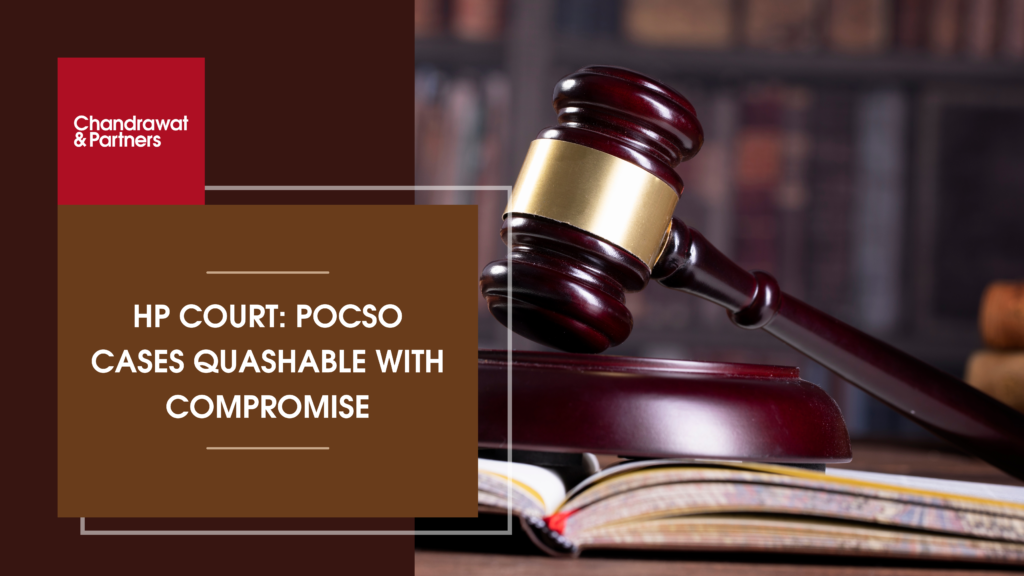Share :
Introduction
The Indian judiciary has been actively adjudicating judgments in matters falling under the ambit of the Protection of Children from Sexual Offences Act, 2012 (“POCSO”). The offences under the POCSO Act are not compoundable, as has been rightly held by the courts in numerous cases. In a few cases, the courts have been of the opinion that in case of a settlement between the accused and the victim, depending on the circumstances, the court can allow compromise between the parties.
The ambit of Section 482 CrPC
The High Court has been given unrestricted power under Section 482 of the Criminal Procedure Code (“CrPC”) in furtherance of doing complete justice. The courts exercise this power sometimes in an unrestricted manner. It has, at various instances even compounded a non-compoundable offence while exercising its power under Section 482. In the instant case of Ranjeet Kumar v. State of Himachal Pradesh, the Single Judge of Himachal Pradesh High Court was of the opinion that the compromise of the child victim and the parents with the petitioner was inconsequential. It was further observed that the role of the complainant had come to an end after putting the criminal machinery into motion by informing the police and in serious offences like the present one, the crime is always against the State and private parties.
This view of the Single Judge was set aside by a division bench and the opinion that cases can be quashed if the victim & accused have reached a genuine compromise and are leading a happy married life was upheld.
Analysis of the judgment-
In a catena of cases, the Supreme Court has upheld the opinion that Section 320 Cr.P.C. does not limit or control the exercise of powers vested in the High Courts under Section 482 Cr.P.C. and the High Courts would have the power to quash criminal proceedings on an FIR under the exercise of power under Section 482 Cr.P.C., even if the offence was non-compoundable under Section 320 Cr.P.C. The Hon’ble Supreme Court drew a distinction between compounding an offence as permitted under Section 320 Cr.P.C. and quashing the complaint or criminal proceedings under Section 482 Cr.P.C. and also Article 226 of the Constitution of India and held that the power of the High Courts under Section 482 Cr.P.C. to quash criminal proceedings or an FIR were not circumscribed by Section 320 Cr.P.C.
In the case of Nikhil Merchant v. C.B.I & Anr, the Supreme Court quashed the proceedings where a settlement was agreed between the parties in a non-compoundable offence. The court opined that technicalities should not be allowed to stand in the way of quashing criminal proceedings, since the continuance of the same after the compromise arrived at between the parties would be a futile exercise. As a result, the courts have an obligation to exercise this power with utmost caution and care. The court in the case of Shiji vs. Radhika held that it is not possible to lay down an exhaustive list of where the exercise of power under Section 482 can be justified. The guideline for the exercise of such power is provided in Section 482 itself i.e., to prevent abuse of the process of any court or otherwise to secure the ends of justice. As has been repeatedly held that Section 482 confers no new powers on the High Court; it merely safeguards existing inherent powers possessed by the High Court necessary to prevent abuse of the process of any Court or to secure the ends of justice.
Conclusion
In conclusion, it is the responsibility of the judiciary, particularly the High Court, to rectify miscarriages of justice and prevent unnecessary legal proceedings. The act of quashing criminal charges based on a settlement between an offender and victim differs from compounding an offence. Cases with a predominantly civil nature, such as those arising from commercial or financial matters, allow the High Court to exercise its discretionary power under Section 482 of the CrPC. In such instances, if the court deems that a compromise has been reached, diminishing the likelihood of conviction, and continuing the criminal proceedings would unduly burden the accused, the High Court may intervene to achieve justice and fairness.
For more information or queries, please email us at
enquiries@chandrawatpartners.com




